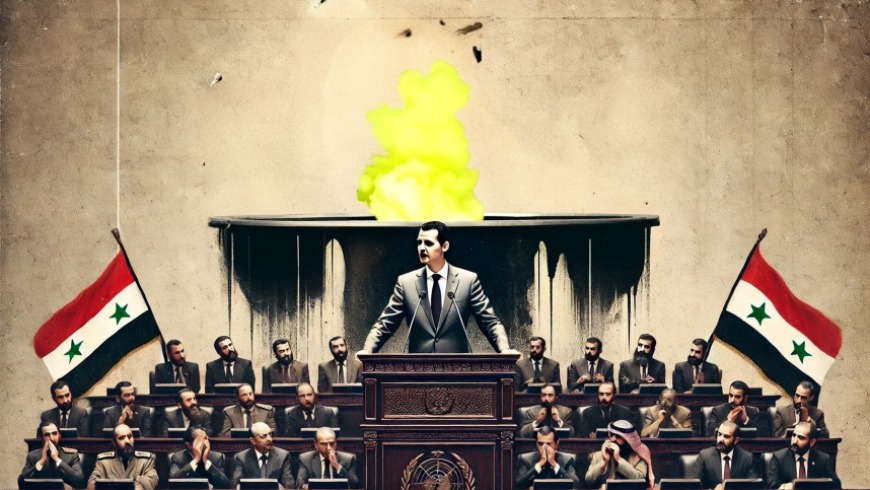
A Criminal Without Remorse: Assad in Parliament on the Anniversary of Chemical Massacre
According to Article 64 of the 2012 constitution, Bashar al-Assad could have convened the new People's Assembly on any day.
This article was published at Syria TV in Arabic: https://bit.ly/4fRkeHs
On August 11, Bashar al-Assad issued a decree calling the new People’s Assembly to convene for the first time on Wednesday, August 21. It seems evident that Assad chose this specific date intentionally, as it marks the anniversary of the chemical massacre in Eastern Ghouta, which his regime perpetrated on the morning of Wednesday, August 21, 2013. This massacre claimed 1,429 lives, including 426 children.
Assad’s call for the assembly on this date carries a symbolic and provocative message: “I did what I did, and I will not be held accountable. Instead, I will be applauded for what I did 11 years ago and for what I have continued to do since.” By doing this, Assad reinforces his commitment to the crimes he has committed and the long series of violations against the Syrian people.
The fact that he stood on the podium of the Council after all these years highlights the weakness of the international community in holding him accountable, as the global response has largely been limited to confiscating the weapons used in the crime.
The past years have demonstrated that Assad has not and will not hesitate to use any means necessary against the Syrian revolution, something the Syrian people have painfully experienced. Ironically, many countries that once demanded the overthrow of his regime have since backtracked, shifting towards normalization with him. This shift marks a significant turning point in the Syrian crisis as a whole.
One of the most significant risks associated with normalizing relations with the Assad regime is the potential to signal that the use of chemical weapons can occur without consequence globally. The mere notion of impunity might embolden other states or dictatorships to adopt similar tactics. While chemical weapons may not always be the tool of choice, the broader approach of using violence against civilians could go unpunished if the right political conditions exist. However, murder remains murder, whether committed with chemical or conventional weapons.
Furthermore, normalization with the Assad regime threatens efforts to combat the proliferation of weapons of mass destruction. Allowing the regime to remain in power without facing consequences could undermine international treaties, such as the Chemical Weapons Convention, and weaken global oversight mechanisms. This, in turn, would make it more challenging to impose sanctions or take action against states or entities that violate these treaties.
Double messages for the country and abroad: “I do not regret”
According to Article 64 of the 2012 constitution, Bashar al-Assad could have convened the new People’s Assembly on any day other than the anniversary of an event deeply ingrained in the collective memory of millions of Syrians. However, his decision to do so on Wednesday, August 21, symbolically disregards their pain.
It also sends a clear message that he is prepared to repeat his past actions without remorse or guilt.This choice carries implications both internally and externally. Domestically, within the loyalist environment, it reinforces the notion that Assad remains firmly in power, indifferent to international criticism or internal dissent.
He presents himself as an unaccountable “president” who feels no shame for the past but instead views it as part of his success in keeping the regime intact against what he claims was a “global conspiracy.” For his opponents, selecting this specific date is a provocative act that underscores the continued repression and brutality of Assad and his regime. It serves to deepen the wounds and amplify the despair of those who once hoped for justice and accountability for the crimes committed against them and their loved ones.
